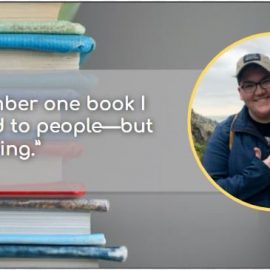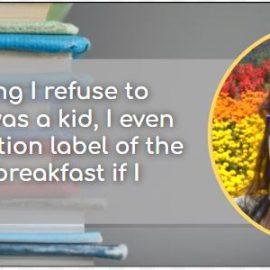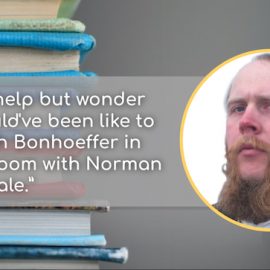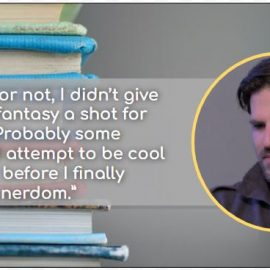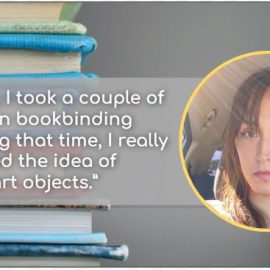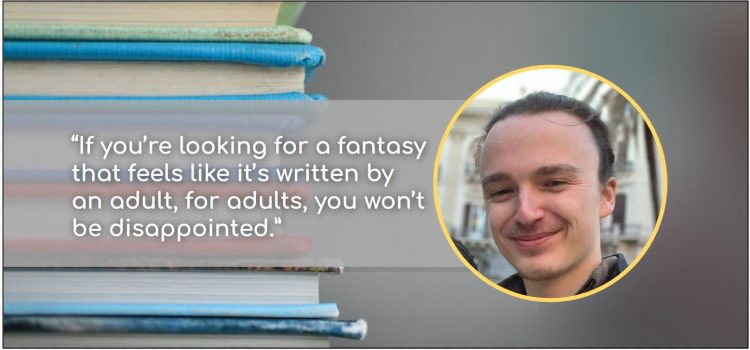
What problem does David have with standard fantasy and sci-fi? Why did he stop reading self-improvement books?
David is a Shortform guide writer from New York but currently resides in Italy. He’s a proponent of slow living and has recently begun to find a passion for poetry.
Our Interview With David
Recently, we interviewed one of our guide writers, David, to learn more about his reading tastes. Here’s what he had to say.
What kind of work do you do at Shortform?
I write book guides, distilling many pages into a few succinct ones that give the book’s ideas quickly and clearly. This is a fun challenge since there’s a wide variety of book styles and structures. I have a fairly analytical mind, so I enjoy the logical rearranging and restructuring of books that are more narrative-first.
I also do commentary, which is both my favorite part and my least favorite part. It can be pretty difficult to come up with dozens of connections to an author’s ideas, research them, and write substantive comments that support, refute, or expand on what a book has to say. But, it’s super worth the effort, and one of my favorite things is to explore the commentary angles on our other guides for inspiration and generally cool knowledge.
What’s your favorite book and why?
To be super basic, Dune by Frank Herbert. I was super into fantasy and sci-fi fiction growing up, and Dune sort of blends those while also offering a more mature story and a lot of re-readability due to the different levels at which you can read the book.
To be less basic, I really enjoyed The Long Price Quartet by Daniel Abraham. It’s a sort of niche fantasy-ish sequence of four books that has some excellent world-building, including a magic system that manages to break the mold. And, it’s really more about the characters and their relationships and the choices they make, rather than some generic fantasy Big-Bad-coming-to-slay-the-world story. Abraham explores themes of loyalty, trust, intimacy, class struggles, wealth gaps, xenophobia, intercultural communication, heritage, fatherhood, familial bonds, and so on. There are no real heroes, no real antagonists—just a lot of flawed, complex people making tough choices in a tough world.
What’s on your reading list these days?
Most recently, what I’ve been spending time with isn’t a usual book but more of a manual. Light on Yoga is a book that compiles B. K. S. Iyengar’s yoga method and transmits the traditional philosophy of the discipline. It’s the best book I’ve found on authentic, traditional yoga. And it showed me that I don’t really practice yoga, just asanas—the physical poses.
Soon, I’d like to read The Romance of Reality by Bobby Azarian. He’s tried to weave a new narrative of a worldview that goes beyond the stale 20th-century scientific worldview of “life is a fluke, everything is just particles, the universe is cold and dead and probabilistic, and entropy is taking everything into greater chaos.” Supposedly, his account—that reality is innately creative, life is meaningful, and humanity has an important role to play in the ongoing unfolding of the cosmos—is supported by bleeding-edge research, and our mainstream view just hasn’t caught up yet.
What’s your favorite genre? Why does it intrigue you?
I’m sort of getting into poetry lately, and it’s more of a feeling drawing me there than anything rational. I never really saw the art in poetry when I was younger. But, as life has started to feel more meaningful, I think I’m starting to get it. I’m excited to find poetry that really speaks to me.
Are there any book genres or tropes that you dislike or refuse to read? Why?
“I’m Bobby Robertson. I’m a big successful business leader, and I’m here to teach you how to culture up your business culture and get those people happier and more productive than ever!”
Uh … also generic fantasy and sci-fi, which is, as far as I’ve found, a lot of it. It doesn’t always have to be a big evil dude versus an unprepared, unsuspecting hero-to-be, guys!
What’s your favorite way to read a book?
I kinda love audiobooks because they let me do something else while listening. I can “read” while cooking, doing the dishes, walking, etc. But, if I actually have free time, paper is the best. Screens just lack that something special—I don’t know, maybe digital books feel cheaper to me.
What book do you think everyone should read in their lifetime? Why?
Oof, big question. Maybe this is a weird answer, but I’ll say Changes in the Land by William Cronon. It’s an award-winning work of environmental history that explores, in great detail, how the arrival of European colonists in the Northeast of America profoundly changed the ecology of the region and spelled the end for the Northeast’s indigenous societies. It’s an incredibly well-crafted look at what was, what happened, and where we are now. A must-read for anyone interested in the environmental history of our planet.
Who are your favorite authors?
I’m not much of a “fandom” kind of person. I don’t have any deep loyalties to any particular author, and I’m all too aware that you shouldn’t meet your heroes. So, I just don’t have any.
How have your reading tastes changed over the years?
Growing up, I was super into fantasy and sci-fi. But, I think I sort of burned out on those—too many days-long reading binges, and now the best reads are gone. Then, I went on a bit of a reading hiatus through college—it just wasn’t what I needed at the time.
Afterward, I went pretty all-in on personal growth. I read a bunch of those books until I realized that there are actually relatively few unique ideas out there about how to grow. A lot of books seem to just repackage fairly same-same approaches for different audiences with different tastes.
Now, I’d say I’m heading toward a “sophisticated” reading arc. That is, I’d like to get into what’s traditionally considered “literature.” But, not necessarily just books by stuffy old white men. I mean books that are contemporary but written in the tradition of literature—if that makes sense. Specifically, I’ve been looking through reading lists of books by Global South authors that would be considered very countercultural or subversive in my country—the U.S.
Was there a specific book that sparked your love of reading?
I really couldn’t remember. I started reading so young, and I think I just always loved it.
Do you have any guilty pleasure books?
I really liked The Wheel of Time in high school; I went back to the series about a year ago and, despite how dumb and poorly aged the writing can be, I still enjoy the overall adventure of the story. So, it’s a guilty pleasure because I know the prose is kinda mediocre and the tropes are obnoxious, repetitive, and sometimes sexist. So rereading it was a mixed experience, where I tried to wade through the bad parts for the guilty pleasure of the few peaks of quality fantasy adventure. Anyway, I didn’t actually finish it either time, so make of that what you will.
What’s an interesting fact that you learned from a book recently?
From Stealing Fire: Scientists are figuring out how to 3D-print molecules from households basics like soybean oil. And, some are researching how to 3D-print psychedelics. Wild.
Have any books you’ve read caused you to make any life changes or to develop any habits?
When I was, like, seventeen, Jen Sincero convinced me to “trust the universe.” I’m no longer into pop spirituality, but I do find that having some sense of trust in the natural process of life helps the day-to-day feel more poetic and more wondrous. No “Source” or magic belief necessary.
What’s your favorite quote from a book or an author?
“The mystery of life isn’t a problem to solve but a reality to experience” (Frank Herbert, Dune). This probably hits a lot harder in the context of the book. Anyway, it really helped me get past having inherited the very rational, analytical approach to life that Westerners have historically pursued.
What are your favorite book adaptations and why?
Geez, continuing to be basic, I do enjoy Denis Villeneuve’s adaptation of Dune. Talking it over with a friend and fellow Dune aficionado afterward, we agreed that it’s a necessarily shallow interpretation of the source, yet it preserves the essential thread and themes of the story and somehow also manages to be a decent big-screen blockbuster. Of course, I’d have been happy to have an obnoxiously long and in-depth movie, but that’d never be financially feasible. So, this is a happy compromise, as far as I’m concerned.
Are there any lesser-known books that you’ve read that you want others to know exist?
I would definitely double down on my earlier mention of The Long Price Quartet. If you’re looking for a fantasy that feels like it’s written by an adult, for adults, you won’t be disappointed. Super, super creative world-building and a rich cast of characters to love and hate and feel all sorts of ways about. And, it’s four books deep, so you can soak it up for a while!
At Shortform, how do you go about working on a book that has viewpoints you don’t agree with?
To be honest, I’ve always been a sort of chameleon. So, what I mean is this: I score very high on agreeability on all major personality tests, and those predictions bear out as true in my life. So, I don’t have a particularly hard time setting aside my own views and giving the author a fair shake. If a viewpoint is explicitly political, well, I grew up with one conservative parent and one liberal parent, so I’m used to hearing out both sides.
I’ve become more opinionated over the years, though. So, if I do disagree with an author’s contentions, I just set that aside until I get to the commentary. Then, that’s a good opportunity to research my intuitions and offer readers a grain of salt with which to take the author’s thoughts. It’s not my job to insert personal opinions; it’s my job to provide well-researched, balanced information for the reader to consider.
Are there any books you had to read for Shortform that you thought you wouldn’t like and ended up loving?
I dove into The Protestant Ethic despite the insanely dense and convoluted prose, and it ended up being a very compelling argument for how our modern, hyper-productivity-focused culture came about. Well, it’s more precise than that, and Weber would probably write me an angry rejoinder for mischaracterizing his argument here in this interview. But, the guide is great!
What are your favorite books in the Shortform library and why?
I’d recommend The Great Mental Models collection—we have guides for all three volumes. The Highly Sensitive Person by Elaine Aron is also great; so is Quiet, by Susan Cain. Last, Mythologies by Roland Barthes and Adult Children of Emotionally Immature Parents by Lindsey Gibson.
David’s Recommended Reading List
- Dune by Frank Herbert
- The Long Price Quartet by Daniel Abraham
- Changes in the Land by William Cronon
About the Series
At Shortform, we want to give our employees names and faces so you can get to know the people who make the magic happen. That’s why we’re doing the Shortform Reads series, where we interview our employees and share their thoughts and opinions. You can check out more employee interviews here.

